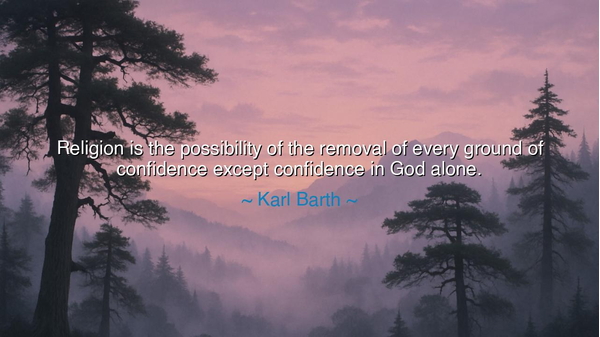
Religion is the possibility of the removal of every ground of
Religion is the possibility of the removal of every ground of confidence except confidence in God alone.






In the solemn and luminous words of Karl Barth, one of the great theologians of the modern age, we encounter a truth that pierces through all illusions of human strength: “Religion is the possibility of the removal of every ground of confidence except confidence in God alone.” These words are not the utterance of comfort, but of revelation. They are a reminder that true faith begins not in abundance, but in stripping away—that religion, in its deepest sense, is not the addition of beliefs or rituals, but the surrender of every false foundation until nothing remains but the trembling trust of the soul in the infinite mercy of God.
Karl Barth, writing in the shadow of war and the collapse of human certainties, was a man who had seen the idols of modernity rise and fall. He watched as nations placed their faith in power, reason, and progress, only to see those gods fail them in fire and ruin. It was out of this storm that his theology was born—a theology of grace and dependence, of the soul standing naked before the living God. For Barth, religion was not a structure of control or a ladder to heaven, but a reckoning: the recognition that all human wisdom, righteousness, and self-reliance must fall silent before the majesty of the divine. To trust in anything less than God is to build upon sand.
In saying that religion removes every ground of confidence, Barth means that faith must demolish the fortresses we build around ourselves—the illusions of control, of certainty, of moral pride. When the storms of life come, wealth cannot save us, knowledge cannot sustain us, and even human love, though precious, cannot still the deepest fear. The true believer, Barth insists, is the one who, having been stripped of all else, still stands and says: “Though He slay me, yet will I trust in Him.” For only when every earthly support has fallen away do we discover what is eternal—and that is God alone.
History is filled with witnesses to this truth. Consider Job, the ancient figure of patience and endurance. Stripped of his children, his fortune, his health, and even the comfort of his friends, he sat in ashes, broken yet unbowed. When all the world’s promises had failed him, he still lifted his voice toward the heavens and declared his faith. In that moment, Job understood what Barth would later express: that faith is not built on what God gives, but on who God is. When all grounds of confidence—possessions, reason, reputation—are removed, the heart discovers that its only sure foundation is divine grace.
Or look to Dietrich Bonhoeffer, Barth’s contemporary and student, who stood against the tyranny of Hitler’s regime and paid with his life. From his prison cell, awaiting execution, Bonhoeffer wrote words filled with quiet, unshakable peace: “Who am I? They mock me, these lonely questions of mine. But whoever I am, Thou knowest, O God, I am Thine.” Even as every human assurance was torn from him—freedom, safety, future—his soul rested in the one confidence that could not be destroyed: trust in God alone. His faith was not naïve; it was the faith of one who had seen the world’s foundations crumble and had found beneath them the bedrock of eternity.
In this way, Barth’s quote challenges the pride of every age. We moderns, like those before us, place our confidence in systems, in progress, in intellect, in the works of our own hands. We seek salvation in politics, comfort in wealth, meaning in acclaim. But these are shifting shadows. The essence of religion, Barth teaches, is to be delivered from these illusions—to let the walls of self-sufficiency fall until only the presence of God remains. It is not despair to lose all else and still believe; it is freedom. For when the soul has no confidence but in God, it can face anything—poverty, suffering, even death—with peace.
The lesson, then, is both humbling and liberating: do not anchor your heart to what can perish. Let your confidence rest not on possessions, not on power, not on your own strength, but on the One who endures beyond all time. To live by this truth is not to flee the world, but to walk through it unafraid, knowing that every loss and every trial only drives you closer to the eternal. Seek not a life of control, but a life of trust. For when every lesser confidence is gone, what remains is the only thing that was ever truly real—the presence and faithfulness of God.
So remember this, O listener: faith is not comfort, but surrender; not certainty, but dependence. When all else falls away, let your heart rest in the one foundation that cannot fail. This is the meaning of Karl Barth’s wisdom—that religion, in its purest form, is not a structure of men, but the still, enduring voice of trust that whispers through the ruins of every false hope: “Be still, and know that I am God.”






AAdministratorAdministrator
Welcome, honored guests. Please leave a comment, we will respond soon